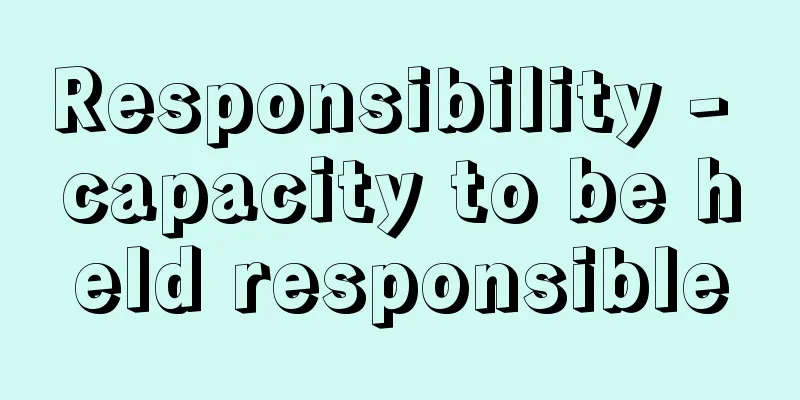Responsibility - capacity to be held responsible

|
In order to be held criminally responsible, the perpetrator must have a certain level of personality that allows him or her to be held responsible. This is called criminal responsibility, and is considered to be a prerequisite (condition) or element of responsibility. However, there are two positions on the meaning of criminal responsibility, reflecting the conflict between moral responsibility theory and social responsibility theory over the nature of responsibility. In the moral responsibility theory, criminal responsibility is considered to be the capacity to commit a culpable act, that is, the ability to judge right from wrong (ability to distinguish right from wrong) and the ability to control one's own actions based on that discrimination (ability to control behavior), assuming moral blame, while in the social responsibility theory it is understood to be the ability to adapt to punishment (ability to receive punishment or adaptability to punishment). Regarding the method of judging criminal responsibility, looking at examples of legislation in other countries, there are three types: a biological method that judges whether someone is normal or abnormal from a psychopathological perspective, a psychological method that judges the perpetrator's ability to distinguish right from wrong and ability to control behavior at the time of the act, and a mixed method that uses both standards. The Japanese Criminal Code only provides that "the acts of a person who is mentally incompetent shall not be punished" (Article 39, paragraph 1) and that "the acts of a person who is mentally impaired shall be punished with a reduced sentence" (Article 39, paragraph 2), without clearly stating the definition or method of judgment. However, precedents have defined insanity (incompetence) as, for example, "a state in which a person is unable to discern right from wrong due to a mental disorder and is unable to act in accordance with this discernment," and are considered to be based on the mixed method described above, and the prevailing view seems to be in line with this way of thinking in precedents. According to this view, incompetence is a case in which this capacity is lacking due to a mental disorder, and limited criminal responsibility (impaired mental capacity) is a case in which this capacity is significantly weakened. It is understood that "mental disability" includes not only continuous ones such as mental illness and intellectual disability, but also temporary ones such as intoxication, drug intoxication, and hypnotic states. Furthermore, the current Criminal Code has a provision regarding criminal responsibility that states, "The acts of persons under the age of 14 shall not be punished" (Article 41). This is based on the policy judgment that not only are persons under the age of 14 mentally immature and therefore lack the ability to distinguish right from wrong or to control their behavior, but also that punishing such minors would have a negative impact on the healthy development of their minds. [Tetsuro Nawa] [Reference items] | | |Source: Shogakukan Encyclopedia Nipponica About Encyclopedia Nipponica Information | Legend |
|
刑事責任を問いうるためには、行為者が責任非難を課しうる一定の人格的適性を有しなければならない。これが責任能力であり、責任の前提(条件)または要素とされる。ただ、責任能力の意義については、責任の本質をめぐる道義的責任論と社会的責任論との対立を反映して、次のような二つの立場がある。道義的責任論では、責任能力とは有責行為能力、すなわち、道義的非難を前提として、是非善悪を判断しうる能力(是非弁別能力)とその弁別に従って自らの行動を制御しうる能力(行動制御能力)であるとされるのに対して、社会的責任論の立場からは、刑罰に適応しうる能力(受刑能力または刑罰適応性)であると解される。責任能力の判断方法に関しては、諸外国の立法例をみると、精神病理学的観点から正常か異常かを判断する生物学的方法、行為時での行為者の是非弁別能力と行動制御能力とを判断する心理学的方法、両基準を併用する混合的方法、の3種がある。 日本の刑法は、責任能力に関し、「心神喪失者の行為は、罰しない」(39条1項)、「心神耗弱(こうじゃく)者の行為は、その刑を減軽する」(39条2項)と規定するにとどまり、その定義や判定方法について明言していない。ただ、判例は、心神喪失(責任無能力)につき、たとえば「精神の障害により事物の理非善悪を弁識する能力なく、また、この弁識に従って行動する能力なき状態」などと定義しており、前述の混合的方法によっているものと考えられ、通説もおおむねこのような判例の考え方に従っているものと思われる。このような見解によれば、責任無能力とは、精神の障害によりこの能力を欠く場合であり、限定責任能力(心神耗弱)とは、この能力が著しく減弱している場合であることになる。なお、「精神の障害」とは、精神病、知的障害のような継続的なもののほか、酩酊(めいてい)、薬物中毒、催眠状態のように一過性のものも含む、と解されている。 さらに、現行刑法は、責任能力に関し、「14歳に満たない者の行為は、罰しない」(41条)という規定を設けている。これは、14歳未満の者は精神の発育が未熟であるため、是非弁別能力や行動制御能力が不十分であるばかりでなく、このような年少者を処罰するとその心神の健全な発達に悪影響を及ぼすという政策的判断に基づく。 [名和鐵郎] [参照項目] | | |出典 小学館 日本大百科全書(ニッポニカ)日本大百科全書(ニッポニカ)について 情報 | 凡例 |
>>: Policy reserve; premium reserve
Recommend
Blue Whale Unit (English)
... In the 1970s, anti-whaling movements grew wor...
Larsa
An ancient Babylonian city located 32 km southeast...
Commercial tax - shozei (English spelling) shang-shui
A commodity tax in China. In the narrow sense, it ...
Straddle
The name of hunters (Karyudo) of Tohoku mountain ...
Nitrite reductase
... Reactions that take place within chloroplasts...
pas de bourrée (English spelling)
…This is sometimes called a grand pas de deux. pa...
Otto Art - Otto Bijutsu
German art of the early Middle Ages flourished ove...
Training car
...Many of them are operated together with work c...
Ishiyama Honganji Rebellion
The Ikko Ikki uprising fought against Oda Nobunaga...
Adventure novel - boukenshosetsu
The basic format of an adventure novel is a plot ...
Town official - machiyakunin
It can also be read as "choyakunin." In ...
Eastern diamond-back rattle snake
...The main component of the venom is hemotoxic t...
Forrestal
...However, aircraft carriers have the following ...
Kyrenia [Mountains] - Kyrenia
… [Nature] The coastline is winding and has many ...
Senkichi Narumi
A full-length novel by Ito Sei. It expresses the t...









